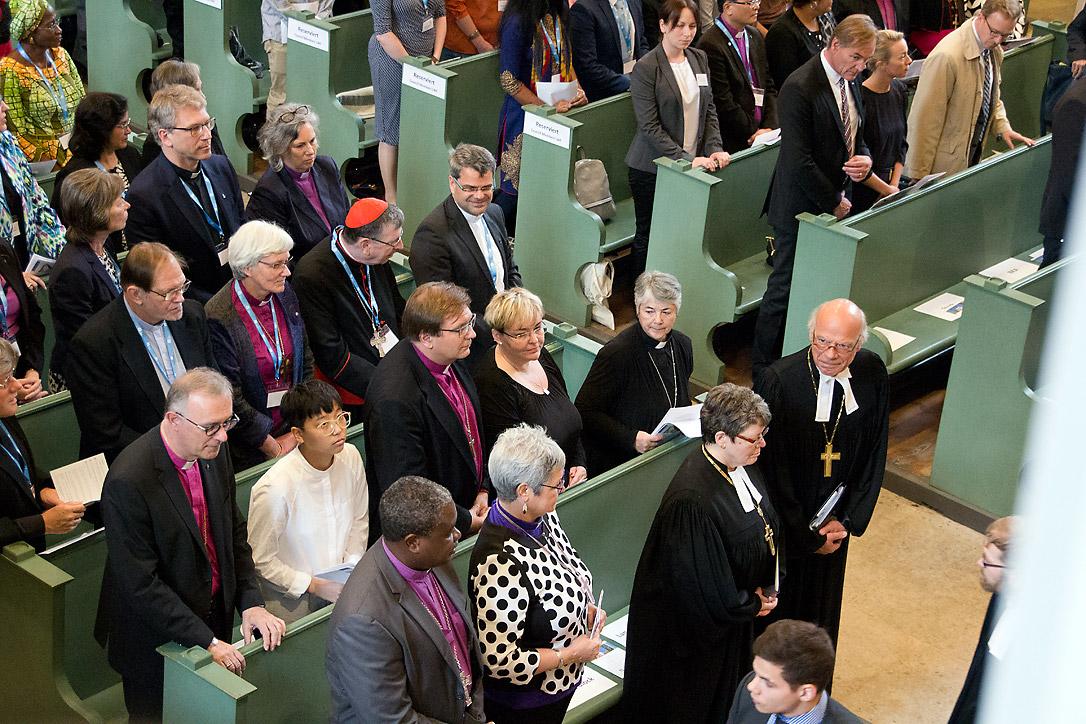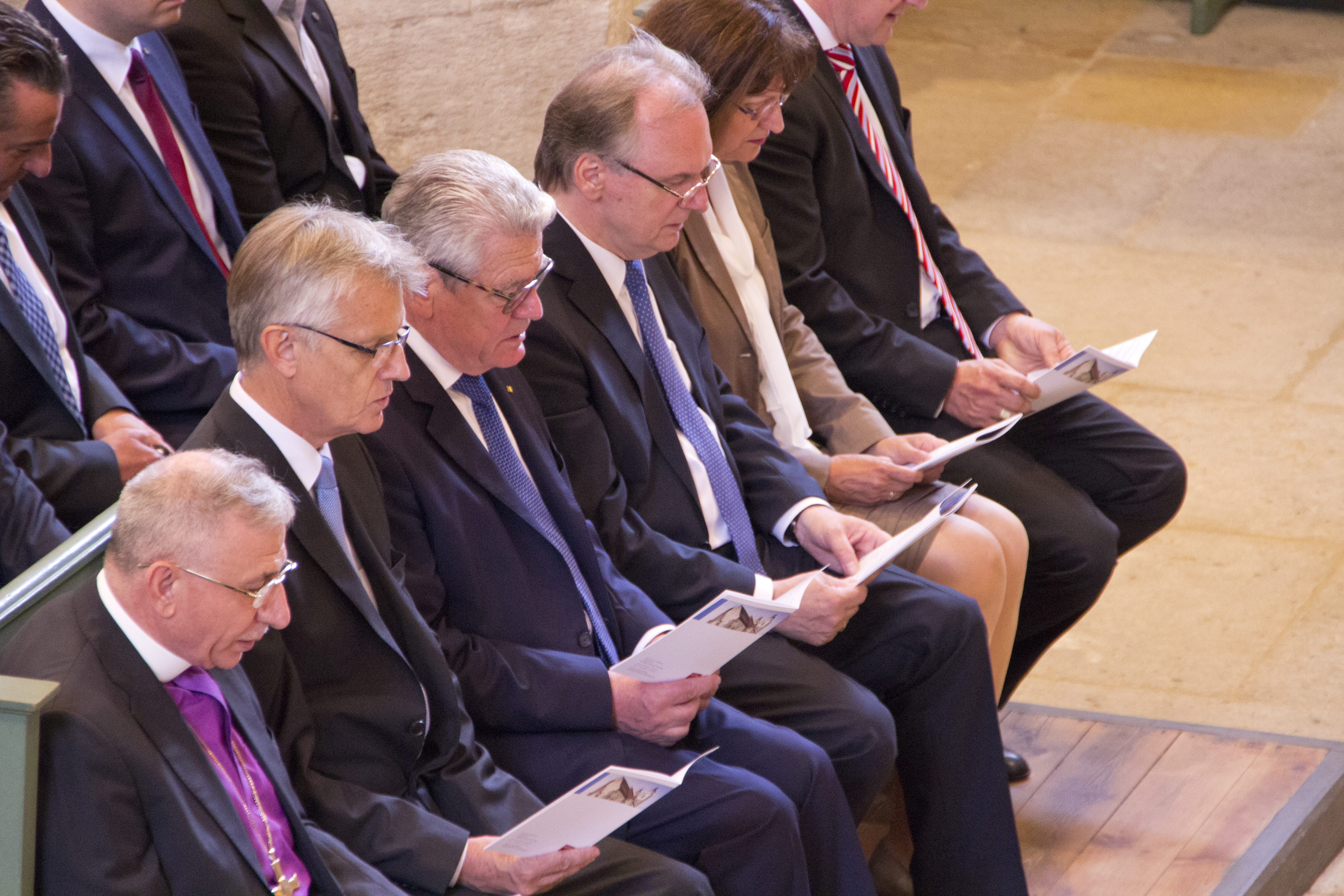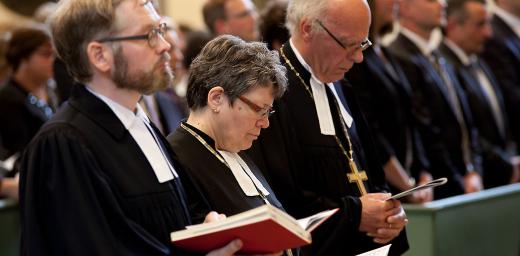Inspired by “a miracle of peaceful revolution”

Bishop Gerhard Ulrich, chairperson of LWF German National Committee and Bishop Ilse Junkermann of the Evangelical Church in Central Germany enter the Town Church in Wittenberg for opening worship service. LWF/Felix Kalbe
LWF Council opening worship at Wittenberg’s town church
The Lutheran World Federation (LWF) Council meeting formally opened today, 15 June, with worship in Wittenberg’s Town Church. Bishop Gerhard Ulrich, chairperson of the LWF German National Committee preached at the eucharistic service attended by the President of Germany Joachim Gauck, LWF Council members and invited ecumenical guests.
Ulrich spoke of “the miracle of a peaceful revolution” in 1989, which then led to German unity. “The sharpest weapon is no weapon at all: it is being interested in others, loving the neighbor and walking upright. People began to rise up. They regained their dignity. But they did not empower themselves. The demonstrators allowed themselves to be given strength and orientation through attending services of worship.”
These events and “the many other new beginnings, the miracle of humanity of which we can report in our churches testify to a faith “that is earthed in God’s love and therefore already somewhat seized by God’s great purpose for the world,” he said. Ulrich recalled these events and how they relate to this year’s Council meeting theme: “Grounded in God’s love—discerning God’s future.”
He said: “This faith is not content with what our eyes see and what we apparently cannot change.” It does not keep silent in the face of the millions of refugees in the world, or of the persecution and bombing of Christians and of many other people who are persecuted for their faith. It is not appeased in the face of many forms of hardship. The bishop of Schwerin urged: “The only remedy is to eliminate the reasons pushing people to flee. Enough of land occupation, land grabbing, exploitation, weapons exports. Start to stop, as he did, the Son of God.”
Freed to share
He reminded the LWF Communion that by God’s grace it was freed not only “from” but also “for” something. It was freed to share its wealth to be able to help people. Likewise, Europe was freed not to build its wealth on the poverty in other parts of the world. “Having been set free by God we experience one another as enriching and, at the same time, as an assignment. That is more than freedom of choice.”
Christians are called upon to freely assume social responsibility. “But we are also freed to run our own lives,” Ulrich continued. “Because they were enjoying this right, many people were brutally killed and injured in Orlando last Sunday. They fell victim to an ideology that does not tolerate difference. We oppose that with the message of Jesus: love is stronger than hate.”
LWF Council Members join celebrated guests at a worship service to open 2016 meetings. Seated (from left to right): LWF President Bishop Dr Munib Younan and General Secretary, Rev. Dr Martin Junge, German President, Joachim Gauck, and Reiner Haseloff, Minister-President of Saxony-Anhalt. Photo: LWF/Felix Kalbe
Luther’s impact
At the end of the service President Joachim Gauck expressed gratitude that the LWF delegates had gathered “in a free country and in ecumenical solidarity”.
“Without the Reformation Germany would be a different country altogether,” he stated, referring to the “enduring and deep impact” of Martin Luther’s ideas. While Luther had not been the first to translate the Bible into German his powerful and poetic use of language quickly helped to give Germans “a sense of identity.” Furthermore, Gauck added, the Mass was first celebrated in German in that very same church, the City Church, which was “an important step towards the priesthood of all believers.” Gauck said that God’s promise of freedom, of which Luther spoke, meant a lot to him personally. “God accepts people unconditionally. And that makes people free, not to focus on themselves or make themselves reliant on church authority or any secular power, but free to think and believe independently and to act responsibly. “
President Gauck thanked the LWF for its “practical and spiritual assistance” – at present to 2.3 million refugees worldwide. In addition, he underlined that the LWF had remained committed to church unity. “It engages in dialogue with the Catholic and the Orthodox Church as well as with Anglicans, Reformed Churches and other Christians. And it regards both the ecumenical movement and interfaith dialogue as key responsibilities.”
The LWF Council meeting is taking place from 15 to 21 June in Wittenberg, Germany. It is the first of three major events marking the 500th anniversary of the Reformation. They begin with the meeting in historical Wittenberg, where Martin Luther lived and worked, and from where the Reformation spread; continue with a joint Lutheran-Catholic Reformation commemoration on 31 October 2016 in Lund and Malmö, Sweden, where the LWF was founded 70 years ago; and conclude with the Twelfth LWF Assembly in Windhoek, Namibia, which will underline the dimension of the “Reformation as a global citizen”. The theme of these events is “Liberated by God’s grace”. It will be spelled out in the subthemes “Salvation – not for sale”, “Human beings – not for sale”, and “Creation – not for sale”.
The Council meets once a year and is made up of 49 delegates from the member churches in the seven LWF regions. With both ordained and lay members, it has three categories of delegates: 40 percent women, 40 percent men and 20 percent young adults. The nearly 120 participants at this year’s meeting include invited ecumenical guests and other LWF member church representatives, as well as staff from the Communion Office.
Meeting in the historic German town of Lutherstad Wittenberg, the 49 members of the LWF Council from member churches around the world are holding their annual governance meeting. The Council oversees the work of the LWF between Assemblies. This year’s meeting theme is Grounded in God’s love - discerning God’s future. It is the last of the present Council before the LWF Assembly next year, at which a new Council will be formed.




